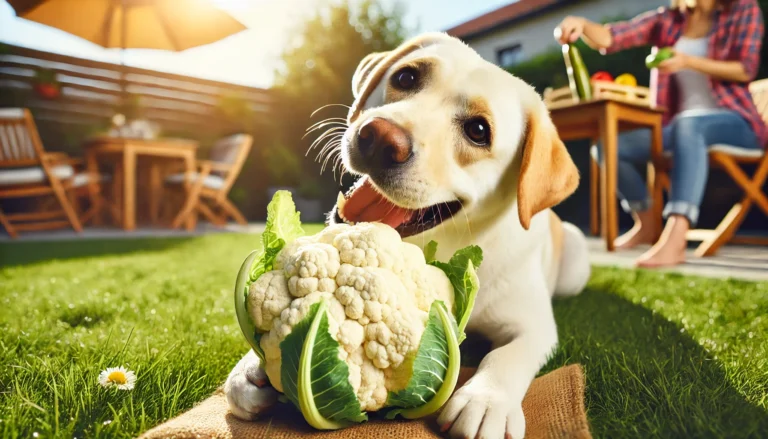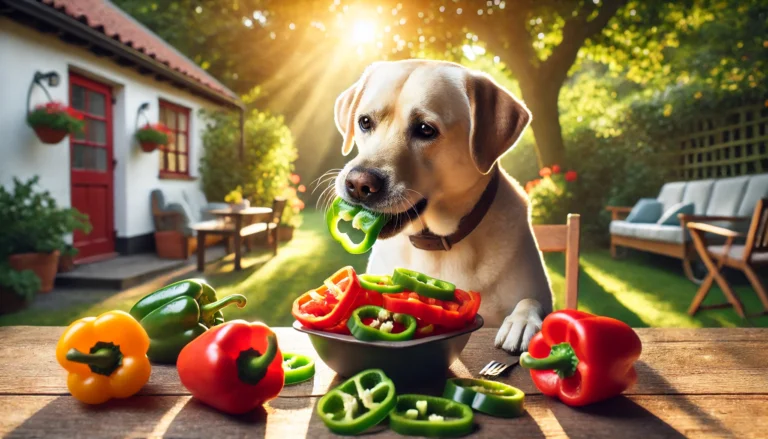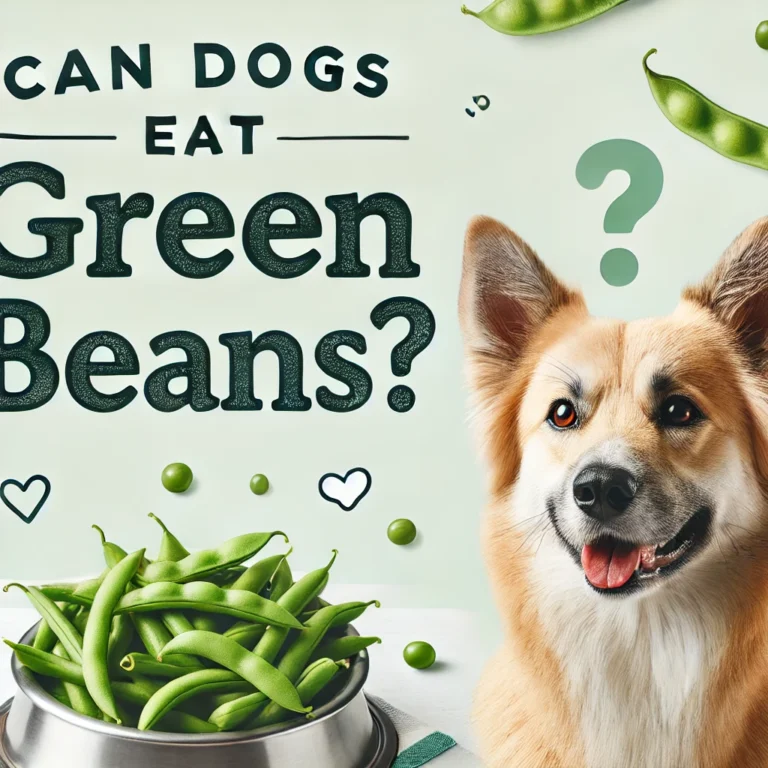can dogs have rice?

Can dogs have rice? The answer is: Yes, dogs can have rice; it is safe and can be beneficial as part of a balanced diet. Rice is a staple food enjoyed around the world, praised for its versatility and ability to act as a simple, comforting ingredient in many dishes. Pet owners often ask, “Can dogs have rice?” when looking for safe foods to share with their furry friends. This article delves into everything you need to know about feeding rice to dogs, covering its benefits, potential risks, and how to include it safely in your dog’s diet.
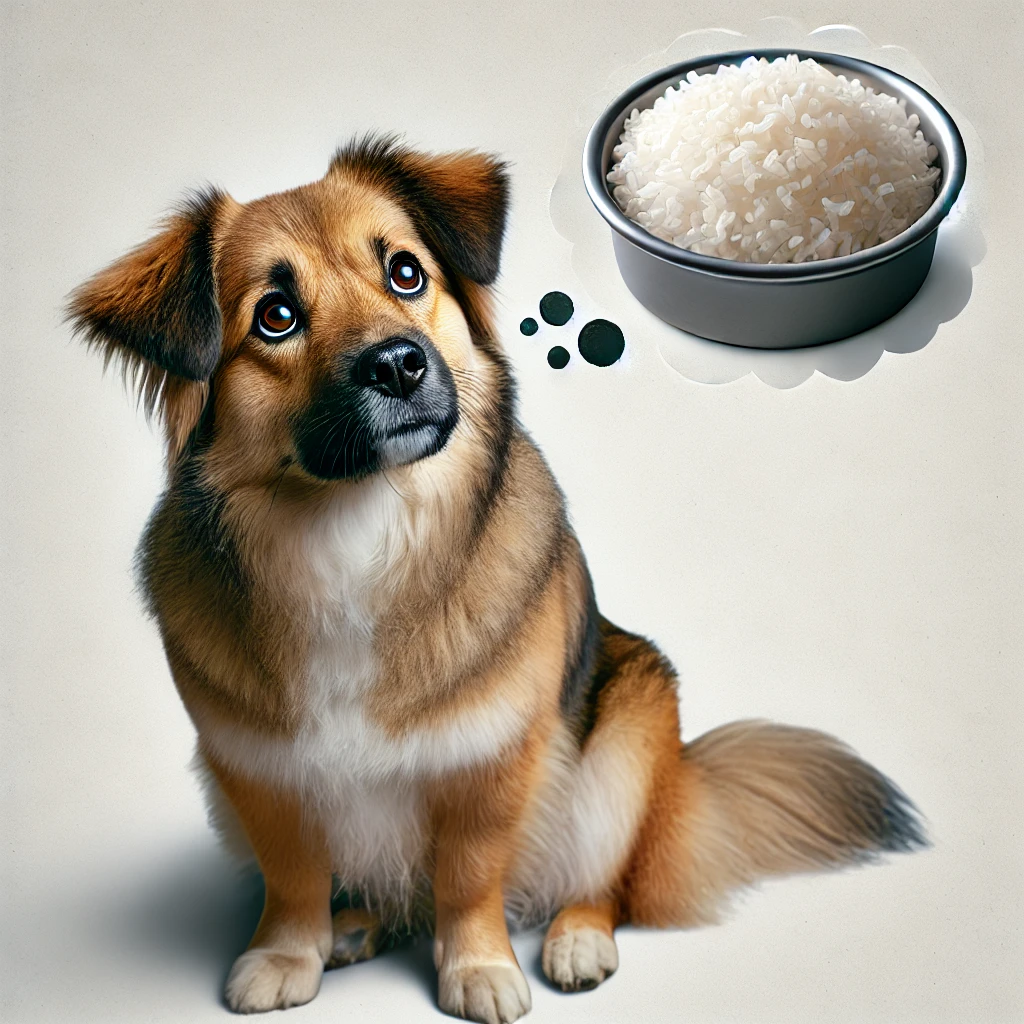
Nutritional Aspects of Rice: Can Dogs Have Rice Regularly?
Rice is a good source of carbohydrates and provides a quick source of energy. It also contains essential nutrients like vitamin B, iron, and magnesium. Brown rice, often touted as the healthiest rice to eat every day for humans, also offers more fiber and nutrients than white rice, making it a potentially better choice for dogs.
Table: Nutritional Content of Different Types of Rice
| Type of Rice | Calories | Protein | Fiber | Notes |
|---|---|---|---|---|
| White Rice | 130 | 2.7 g | 0.4 g | Easy to digest, low in fiber |
| Brown Rice | 112 | 2.6 g | 1.8 g | Higher fiber, more nutrients |
| Jasmine Rice | 181 | 3.5 g | 0.6 g | Aromatic, slightly sticky when cooked |
| Basmati Rice | 121 | 2.8 g | 0.4 g | Long grain, aromatic |
Types of Rice: Which Are Safe for Dogs?
When considering “Can dogs have rice?” it’s crucial to choose the right type. White rice is often recommended for dogs with diarrhea or an upset stomach because it’s easy to digest. However, for regular feeding, brown rice might be more beneficial due to its higher nutritional content. Specialty rice’s like jasmine and basmati can be safe for dogs but offer no significant health benefits over simpler varieties.
Proportion of rice in a balanced dog diet
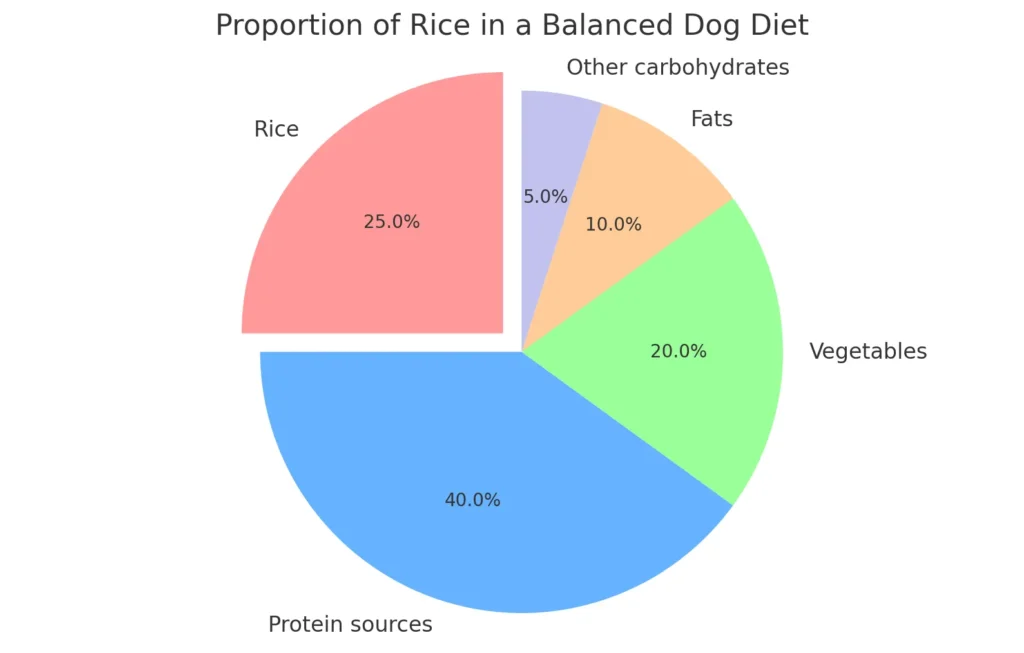
Here’s a pie chart illustrating the proportion of rice in a balanced dog diet, showing how rice can be a part of the dietary mix along with proteins, vegetables, fats, and other carbohydrates. This visualization helps demonstrate how rice fits into the overall nutritional plan for a dog.
Can Dogs Have Rice for Digestive Health?
Rice is a common dietary recommendation for dogs experiencing gastrointestinal issues. “Can dogs have rice when they have diarrhea?” Yes, white rice can help firm up stools and provide some relief. It’s bland and unlikely to irritate the stomach, making it ideal for such conditions.
Tips
Can dogs have watermelon rind? It is also a concerning question among dogs owners, especially in hot climate countries. Well, Watermelon have certain advantages as well as cons on dogs health.
Preparation Tips: How to Cook Rice for Dogs
Cooking rice for dogs is straightforward:
- Boil rice in water until it’s soft and easy to digest.
- Avoid adding spices or oils, which can upset a dog’s stomach.
- Cool the rice before serving to avoid burning your dog’s mouth.
Rice in Dog Diets: How Much Is Too Much?
While rice can be a healthy part of a dog’s diet, it should not be the primary component. Dogs require a balanced diet that includes proteins and vegetables. “Can dogs have rice every day?” It depends on the dog’s overall diet and health, but rice should generally be a complement rather than a staple.
Potential Risks: When Rice Isn’t Right for Dogs
Although rice is safe for most dogs, some risks need consideration:
- Allergic Reactions: Rare but possible.
- High Glycemic Index: Especially in white rice, which could affect dogs with diabetes.
- Arsenic Exposure: Particularly from brown rice, though minimal and not a significant concern for occasional feeding.
Veterinary Insights on Rice in Dog Diets
Veterinarians often suggest rice as a part of a dietary regimen for dogs with specific health issues. “Can dogs have rice according to vets?” Yes, but it should be tailored to each dog’s nutritional needs and health condition.
Alternatives to Rice: Other Safe Options for Dogs
If rice isn’t suitable or if diversity is needed, other safe carbohydrate sources include:
- Sweet potatoes
- Oatmeal
- Pumpkin
Conclusion: Balancing Rice in a Dog’s Diet
Can dogs have rice? Absolutely, but it’s important to maintain balance with other diet components to ensure your dog remains healthy and happy.
Is rice ok for dogs daily?
Rice is generally safe for dogs to eat daily as part of a balanced diet. However, it should not be the main component of their diet. Dogs need a variety of nutrients from different food sources to stay healthy.
Can rice upset a dog’s stomach?
Rice is usually gentle on a dog’s stomach and often recommended for dogs with digestive issues. However, too much rice can lead to unbalanced nutrition and potentially cause constipation.
Can dogs eat fully cooked rice?
Yes, dogs can eat fully cooked rice. It’s easy to digest and a good source of carbohydrates. Ensure it’s plain and cooked without any added fats, spices, or sauces.
Is basmati rice ok for dogs?
Basmati rice is fine for dogs in moderation. Like other types of rice, it should be cooked plain and served in small quantities as part of a balanced diet.
Is rice or potatoes better for dogs?
Both rice and potatoes can be good sources of carbohydrates for dogs if prepared plain and given in moderation. The choice between them can depend on the dog’s health and nutritional needs. Some dogs may be allergic to potatoes, making rice a better option.
Can dogs eat canned tuna?
Dogs can eat canned tuna in moderation. It should be tuna in water, not oil, and without any added salt. Tuna contains protein and omega-3 fatty acids, which are good for a dog’s skin and coat.
Can dogs eat scrambled eggs?
Yes, scrambled eggs are safe for dogs to eat if they’re cooked without butter, oil, salt, or seasoning. Eggs are a great source of protein and several vitamins that are beneficial for dogs.
Can dogs have pasta?
Dogs can have plain pasta in moderation. It provides carbohydrates but little nutritional value, so it should not be a regular part of a dog’s diet. Ensure it’s cooked and served without sauces or seasonings.
Can dogs eat cheese?
Many dogs can eat small amounts of cheese. It’s high in calcium and protein but can also be high in fat. Cheese should be given sparingly as a treat, not as a regular part of a dog’s diet. Avoid high-fat and high-salt cheeses, and be cautious as some dogs can be lactose intolerant.


